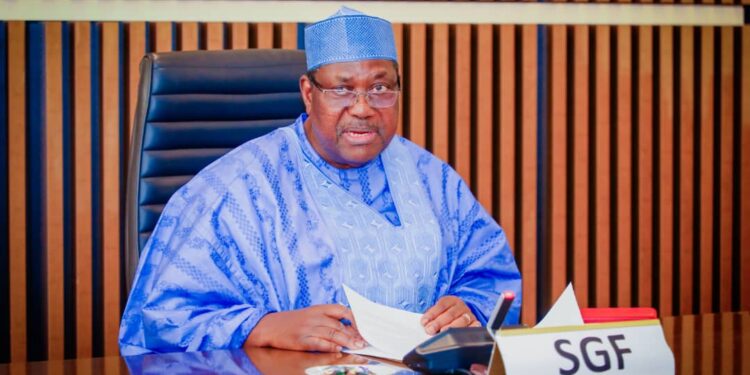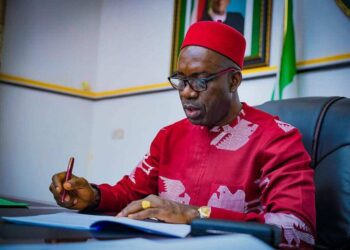The Federal Government has categorically rejected characterizations of Nigeria’s security crisis as genocide against Christians, insisting that insurgents and bandits attack communities across all religious lines without discrimination.
In a comprehensive statement issued on Tuesday, November 19, 2025, the Secretary to the Government of the Federation, Senator George Akume, provided detailed historical context for Nigeria’s security challenges while directly addressing recent controversial pronouncements from the United States government.
The SGF’s statement comes amid escalating diplomatic tensions with Washington following President Donald Trump’s designation of Nigeria as a “Country of Particular Concern” and threats of military intervention over alleged Christian persecution—claims the Nigerian government has consistently disputed.
“No credible international institution has designated the crisis as genocide against Christians. Boko Haram/ISWAP attack both churches and mosques, killing Muslims and Christians alike. Bandits target all communities without religious distinction,” Akume stated in the lengthy document.
The government official emphasized that victims of the violence include “Christians, Muslims, and traditionalists, confirming that the drivers are economic and ideological, not religious extermination.”
Akume warned that misrepresenting Nigeria’s complex security situation as religious genocide carries serious consequences. “The current misrepresentation of the crisis as ‘genocide against Christians’ fuels dangerous religious tensions, emboldens extremist and criminal factions seeking to exploit sectarian narratives, creates diplomatic frictions based on inaccurate interpretations, and undermines Nigeria’s longstanding efforts to build constructive international security partnerships,” he stated.
In a particularly pointed section, the SGF directly linked recent American statements to increased boldness among criminal groups operating in Nigeria. “Recent pronouncements from the United States have inadvertently emboldened opportunistic violent groups seeking to exploit international narratives and make bold statements by attacking soft targets,” Akume asserted.
He noted that before these international statements, “insurgency structures had been significantly degraded and reduced to isolated banditry,” suggesting that the American rhetoric has undermined security gains achieved through military operations.
The statement provided extensive historical analysis, tracing Nigeria’s current security challenges across two major fronts: the North-East ideological insurgency that began in 2002 and evolved through connections with Al-Qaeda and later ISIS, and the North-West criminal banditry that emerged in 2018 driven primarily by economic factors.
On the banditry plaguing northwestern states, Akume was emphatic about its non-religious nature. “The North-West banditry is purely economic deterministic, and not religious factors,” he stated, listing drivers including competition for grazing routes and water resources, cattle rustling, illegal mining of gold and minerals, kidnapping-for-ransom, extortion, and control of agricultural land and transport corridors.
The SGF traced the roots of Nigeria’s insurgency crisis to the broader destabilization of North Africa following the 2011 uprisings in Libya and Egypt. “The collapse of the Libyan state allowed Al-Qaeda-aligned traffickers to loot and disperse heavy weapons across the Sahel. Egypt’s instability further opened corridors for extremist ideologies and foreign fighters’ influence,” Akume explained.
He detailed how weapons flowing through Al-Qaeda in the Islamic Maghreb-controlled smuggling routes entered West Africa and Nigeria, strengthening Boko Haram, Islamic State West Africa Province, and later banditry networks.
The statement provided a timeline of Boko Haram’s evolution from its 2002 founding by Mohammed Yusuf through its 2015 pledge of allegiance to ISIS and subsequent split that created the current ISWAP structure operating across Nigeria, Chad, Niger, and Cameroon.
Regarding military capability, Akume defended the Nigerian Armed Forces as “highly capable, experienced and professional,” noting they have “reclaimed vast territories, degraded Boko Haram/ISWAP leadership structures, and conducted successful multi-theatre operations.”
However, he made clear Nigeria’s position on foreign military intervention. “Nigeria does not require foreign troops. What is needed is targeted support from partners, especially the United States, in the areas of intelligence cooperation, technology and military equipment support for advanced engagement against the insurgents,” the SGF stated.
The statement referenced recent mass-casualty incidents, including the Yelewata Attack in Guma Local Government Area of Benue State between June 13-14, 2025, where at least 100 people were killed according to Amnesty International, Associated Press, and Reuters reports.
Akume detailed the federal government’s response, including his own dispatch to the crisis epicenter with relief materials, a presidential visit to hospitalized victims, directives for a complete census of destruction, and approval of funds for reconstruction of affected areas.
The SGF emphasized Nigeria’s constitutional framework, stating: “Nigeria is a secular state as guaranteed by various provisions of the constitution of the Federal Republic of Nigeria 1999 as amended. No state religion is adopted as a national religion and no citizen of Nigeria is above the Nigerian constitution.”
He noted that the current administration’s appointments “reflect the diversities of our nation and both Christians and Muslims and members of the Federal Executive Council holding key position in equal proportion including the Nigerian security council, the body that deals with all security challenges in Nigeria.”
Looking ahead, Akume outlined the government’s strategy including strengthening nationwide security operations, deepening intelligence-sharing with the United States and allies, intensifying operations targeting illegal mining and trafficking, enhancing rural security and border surveillance, and upholding strict human rights safeguards.
The SGF made a direct appeal for US-Nigeria cooperation based on shared democratic values. “As the United States remains the largest democracy in the world, and Nigeria, the largest democracy in Africa, modeled after the American system, our two nations share a historic responsibility to work together to promote global stability, strengthen democratic values especially in Africa, and confront extremist threats in Nigeria and other neighboring nations,” he stated.
Akume concluded with a patriotic call for national unity across religious and ethnic lines. “In closing, I wish to appeal to the sense of patriotism of all Nigerians irrespective of tribe, religion or political persuasions that now is the time to speak with one strong and united voice to confront a common enemy. The terrorist, bandits and extremists insurgents, and completely eradicate them from our national borders,” the SGF declared.




















